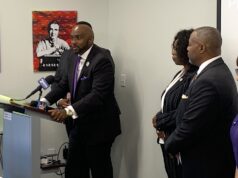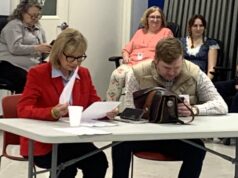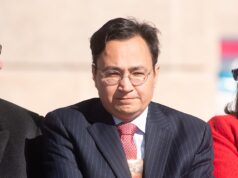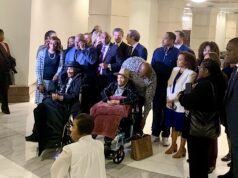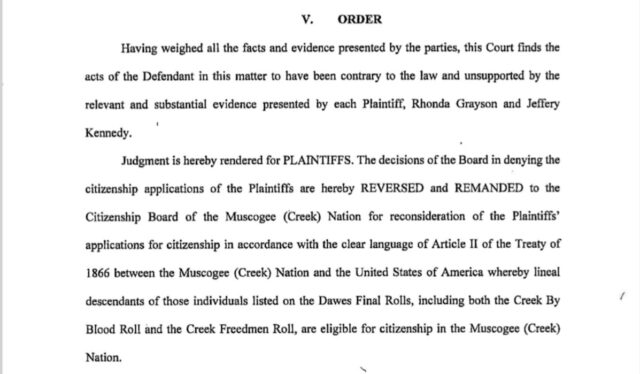
In a case questioning whether the Muscogee Nation Citizenship Board acted properly when denying citizenship applications for a pair of Freedmen, a judge ruled in favor of the plaintiffs Wednesday, saying the tribe’s Treaty of 1866 requires inclusion of the descendants of former slaves. The ruling remands the applications back to the citizenship board for reconsideration, but the nation’s attorney general says the tribe intends to appeal the case to the Muscogee Nation Supreme Court.
Rhonda Grayson and Jeffery Kennedy, the plaintiffs who filed the case after having their applications rejected, are both Muscogee Nation Freedmen — descendants of enslaved people brought to Oklahoma by the Muscogee Nation, which was forcibly relocated here in the 19th century by the U.S. federal government.
While Freedmen in the Muscogee Nation, Cherokee Nation, Choctaw Nation, Seminole Nation and Chickasaw Nation were specified to receive certain tribal rights by treaties signed with the United States in 1866, only the Cherokee Nation recognizes Freedmen as full citizens today. Since those treaties were signed, the Muscogee Nation, Choctaw Nation and Seminole Nation have amended their constitutions in ways that exclude Freedmen from full tribal citizenship, denying them equal rights and privileges. The Chickasaw Nation never enrolled Freedmen into the tribe at all, despite descriptions of their rights in the tribe’s 1886 treaty.
In 1979, Muscogee (Creek) Nation voters adopted a constitution that restricted tribal citizenship to descendants of people listed as “Indian by blood” on the Dawes Rolls, functionally disenrolling Freedmen citizens from the tribe. Freedmen descendants have advocated for citizenship in the Muscogee Nation, and Grayson and Kennedy filed suit after their most recent applications were denied.
While members of the Muscogee Nation Citizenship Board argued that they followed the constitution while reviewing Grayson’s and Kennedy’s applications for tribal citizenship, Muscogee Nation District Court Judge Danette Mouser ruled Wednesday that the board’s decision on both applications conflicted with the Treaty of 1866.
“The court finds that the actions of the board in denying plaintiffs’ citizenship applications and appeals were contrary to law, specifically the Treaty of 1866 and its required inclusion of the Creek Freedmen and their lineal descendants within the citizenship of the Muscogee (Creek) Nation,” Mouser wrote in her order.
The Muscogee Nation intends to appeal Mouser’s order to the Muscogee Nation Supreme Court, said Geri Wisner, the nation’s attorney general.
“We respect the authority of our court but strongly disagree with Judge Mouser’s deeply flawed reasoning in this matter,” Wisner stated. “We will immediately be appealing this case to the Muscogee (Creek) Nation Supreme Court. The MCN Constitution, which we are duty-bound to follow, makes no provisions for citizenship for non-Creek individuals. We look forward to addressing this matter before our nation’s highest court.”
While Wisner argued that the Muscogee (Creek) Nation Constitution disallows citizenship for Muscogee Freedmen, Mouser stated in her order that the tribe’s constitution recognizes the language of its treaties.
“It has long been established that the nation’s constitution is its governing law. At trial, witnesses repeatedly cited the constitution as the law they must follow,” Mouser wrote. “Remarkably, both the nation’s constitution and the Muscogee (Creek) Nation Code of Laws recognize the binding authority of the nation’s treaties with the United States.”
Wednesday’s ruling comes less than two weeks after Muscogee voters reelected Principal Chief David Hill and Second Chief Del Beaver to new terms. During Hill’s first term in office, his administration floated the idea of public forums regarding the Freedmen question, as well as a potential vote of the people. That has not happened, however, and Grayson and Kennedy chose to pursue their options in court.
‘At the end of the day, the Freedmen will win this’
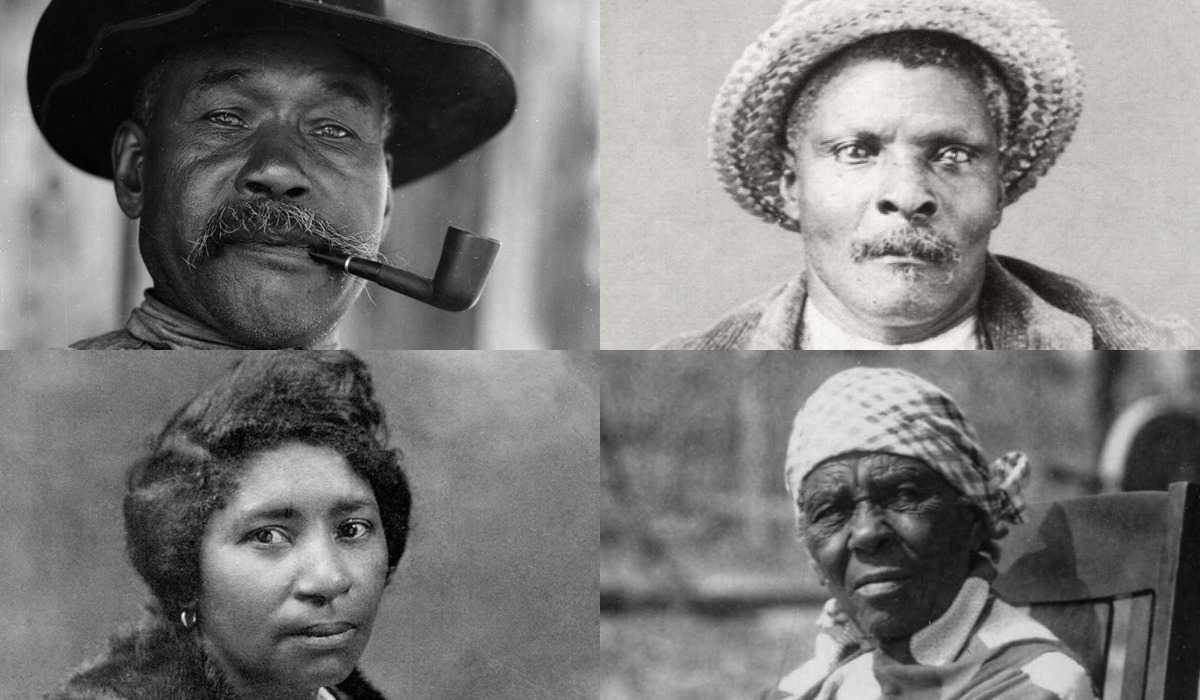
While Freedmen advocates have accused the Muscogee, Choctaw, Seminole and Chickasaw Nations of ignoring their treaty obligations regarding Freedmen citizenship rights, those treaties are the same ones cited to reaffirm the five tribes’ reservations in and following the U.S. Supreme Court decision for McGirt v. Oklahoma.
Ivory Vann, a Muscogee Freedmen and a former member of the Muskogee City Council, said Thursday that he is still “holding his breath” on the case, but he called the tribes’ positions hypocritical.
“That treaty is the supreme law of everything. It’s supreme with everything when it comes to their concerns, but when it comes to Freedmen concerns, they couldn’t give a damn,” Vann said. “It’s the same exact treaty. It ain’t changed.”
Eli Grayson, an enrolled Muscogee citizen who has Freedmen ancestors, posted photos of Mouser’s ruling on his Facebook page. He called Mouser’s ruling a “big win” and said the Muscogee Nation is weakening its argument against Freedmen citizenship by celebrating the Supreme Court’s ruling in McGirt v. Oklahoma, which affirmed the tribe’s reservation in July 2020.
“You have people at the tribe that are pro-McGirt and they don’t really care about the Freedmen,” Eli Grayson said. “But in the fact that McGirt deals with Article Three of that same treaty and the Freedmen deals with Article Two, it’s a win that our tribal courts recognize the treaty and Article Two, because it shows that the tribe is actually supporting McGirt through our own tribal court system.”
Both Vann and Grayson voiced concern about a similar lawsuit in U.S. District Court for the Eastern District of Oklahoma filed by Ron Graham, a Muscogee Freedmen descendant and a member of the Muscogee Creek Indian Freedmen Band. Now that Mouser has ruled in favor of the Freedmen in tribal court, both are concerned that a judge may rule the opposite in federal court. Damario Solomon-Simmons, the attorney for Grayson and Kennedy in tribal court, is also representing Graham in federal court.
“For me, this journey transcended the boundaries of mere legal proceedings,” Solomon-Simmons said in a statement provided to the Associated Press. “It became a poignant quest to reclaim the honor and dignity that anti-Black racism had wrongfully snatched from us.”
A federal lawsuit is ultimately what paved the way to the Cherokee Freedmen earning citizenship within their tribe, which had disenrolled them in 2007 with a constitutional amendment. In 2017, Senior U.S. District Judge Thomas Hogan ruled in Cherokee Nation v. Nash that Cherokee Freedmen were entitled to full citizenship rights, which ultimately led to the Cherokee Nation Supreme Court striking the “by blood” language from its constitution.
“That federal lawsuit in the Eastern District may be something that I wish the Freedmen would dismiss, and let the tribal court system play out, because they may just get the biggest win and it’ll be over,” Grayson said. “If there’s a pending federal lawsuit, it’s not over. It keeps going.”
Regardless, Grayson said he believes the Muscogee Nation Freedmen will ultimately prevail in their fight for citizenship in its tribe.
“At the end of the day, the Freemen will win this,” Grayson said. “But it’s not today. It’s not tomorrow. It’s still a long fight.”











